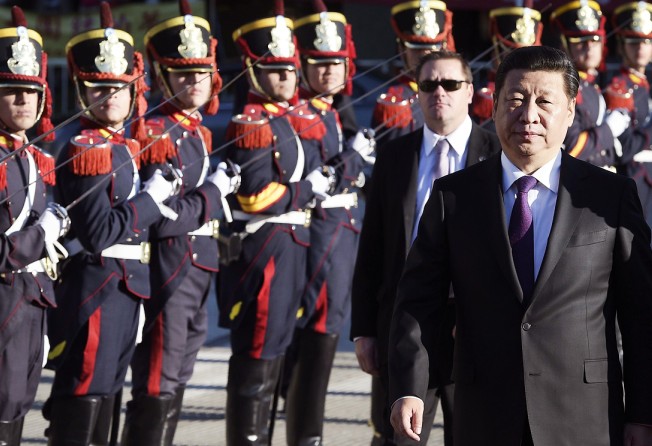In South America, Xi eases the way for bilateral trade
Kamilia Lahrichi notes China's focus on deals to improve transportation

President Xi Jinping's visit to Argentina over the weekend has further eased access to key commodities for China, to support its thriving economy, while strengthening its influence in Latin America.
Xi and President Cristina Fernandez de Kirchner inked 19 agreements on finance, energy, infrastructure, agriculture, trade and cooperation.
The most significant deals included a US$11 billion currency swap, a US$4.7 billion investment in hydroelectric dams in Patagonia and a US$2.1 billion project to revamp a dilapidated freight railway crucial to transporting commodities.
This year marks the 10-year anniversary of the China-Argentina strategic relationship.
China is Argentina's second-largest commercial partner after Brazil, with Sino-Argentine bilateral trade reaching US$17.3 billion last year.
Most Chinese investment in infrastructure in Argentina and Latin America as a whole is done with the aim of boosting transport efficiency and the flow of commodities to China. Since most of the production takes place in the countries' interior, the construction or expansion of terminals, ports and railways, as well as the modernisation of equipment, is necessary for China to secure transport of commodities to its shores.
Thus, renovating Argentina's Belgrano Cargas railway equipment and infrastructure is key to Beijing's growth. This 10,000km network, the "veins of the country", connects 13 of 23 provinces as well as the port of Buenos Aires. It transports cement, coal, metals, wood, sugar, grains, water and wine.
Argentina is an important supplier of agricultural products to China: it was Beijing's principal provider of soya bean oil and peanut oil last year. Argentina has abundant natural resources and is the world's third-largest producer of soya beans and corn. This is a resource the Asian giant needs, as it has limited arable land in per capita terms.
In addition, " Argentina is a stepping stone for China to invest in South America", said Sun Bai, president of the board of directors of China Machinery Engineering Corp, during a forum on the economic cooperation between China and Argentina in Buenos Aires on Saturday. Some 150 Chinese businessmen who travelled with Xi gathered at the event.
Indicative of China's keenness to be a financial power in the region, the central banks of both countries signed a currency-swap deal, allowing the two to exchange local currencies of up to US$11 billion. Argentina can use yuan to pay for Chinese imports, which relieves the pressure due to the country's scarcity of US dollars. It has been unable to tap global capital markets since it defaulted on its bonds in 2001.
For Latin American states, Beijing is a major commercial partner that offers economic and political support at a relatively low cost. Importantly, it does not set any political or moral conditions.
For instance, Argentina buys railway material from China after getting a 10-to-12-year loan from Chinese banks with a reasonable interest rate and the first two years for free.
Beijing also provides an alternative source of financing to countries shut out of international credit markets and reluctant to trade with the US, like Venezuela and Cuba.
Xi is also visiting Venezuela, a key investment market for Chinese energy and financial projects, to ink more agreements, and will conclude his tour on Wednesday in Cuba, China's ideological partner.
Commodity-hungry China is indisputably increasing its clout in Latin America. Xi's courtship is lifting relations between Beijing and resource-rich nations to a new level. "Great distances do not erase intimate friendships," he stressed, citing an old Chinese poem.
Kamilia Lahrichi is an Argentina-based journalist covering China's foreign policy in Latin America. See www.kamilialahrichi.com